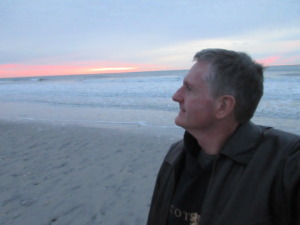Fall Teacher Spotlight:
Christopher Davis
Charlotte Lit is excited to announce that Christopher Davis will be leading a dynamic, generative, in-person workshop for us beginning on Wednesday, September 11 called “Six Weeks, Six Poems.” And you can register NOW!
A well-published poet and a professor emeritus of creative writing at UNC Charlotte, Chris answered a few questions about his writer’s life so you could get to know him better.
If you hadn’t been a teacher and poet, what would you have been?
Both my parents were teachers, and I started writing poetry as a little kid. My first book, stapled together, was an epic poem entitled “And Then the End.” But if I hadn’t been a teacher and poet, I’d have been a singer in a David Bowie/Roxy Music cover band — forever, not just senior year of high school.
What’s a piece of writing advice you got and never forgot?
“Some poets, when they sit down to write, basically transcribe what they’ve already thought about. Other poets write to engage imagination, without knowing where the poem is going.” This was an important aesthetic principle for my first and greatest teacher, a young Jorie Graham. She showed us poems that seemed to clarify and illustrate “thesis ideas,” and then poems with more exploratory creative energy. Her exercises and prompts helped us write into the not-yet-known, a kind of “risk” that makes writing (and reading) transformative.
What’s a book you’ve read recently that you’d recommend? Any genre!
For an exciting reading experience, I recommend a novel from 1974 — Oreo, by Fran Ross, a satirical novel about a biracial girl searching for her father. It’s hilarious, wildly and unpretentiously experimental.
In poetry, I love the work of Matthew Zapruder, Harryette Mullen, Jorie Graham, Mary Szybist, and the incredible poets of the “AIDS Crisis” generation like D. A. Powell, David Trinidad, and the late Reginald Shepherd. And I always come back to the classics: Eugenio Montale, James Tate, Wallace Stevens, and, above all, Emily Dickinson. How is it possible that every time I open Dickinson’s Collected Poems I discover an unbelievably wonderful poem I’ve never noticed before?
What part of retirement do you like best?
Retirement has been a time of tremendous growth, healing, and discovery. I enjoy high-quality social interaction every day. Sobriety has been an adventure in acceptance, fellowship,responsibility and spiritual strength. Life with my handsome partner is a joy. When I began my academic career, I was young, relatively young chronologically, and, in many ways, very young emotionally. By necessity, I did my “growing up” in the context of a complex professional life with many different pressures. Now I can relax a little and simply be the person (and the poet) I have become in the life I’ve been gifted with.
What’s your favorite outdoor activity?
I love to exercise outdoors but I don’t like to waste too much time, so more than anything else I enjoy taking long walks in Evergreen Nature Preserve, reading and occasionally stopping to catch imagery in language.
Describe your teaching style in three words.
Interactive imaginative encouragement.
What are you looking forward to in teaching “Six Weeks, Six Poems” in the fall?
I’m excited by the prospect of engaging in an improvisational, dynamic creative process with poets who have come together to find new inspiration, new images, new voices, and new rhythms. Our primary goal will be to generate material, refining our poems along the way but always with our current poems-in-progress in mind. For me, the most exciting, and challenging, moment in writing a poem is the beginning, when what Wallace Stevens calls the “interior paramour” says, “Hey, wow, I guess this is a poem I’m writing! I wonder what will happen now?”
Write Poems with Chris
SIX WEEKS, SIX POEMS: Wednesdays, September 11, 18, 25, and October 2, 9, 16, 6:00–8:00 p.m., Charlotte Lit, 933 Louise Avenue. Info and advance registration
Enjoy this opportunity to stretch and grow creatively, working with other poets to discover new material; breaking through imaginative boundaries; and finding new voices, images and possibilities for your poetry. Each session starts with a discussion of a particular aesthetic concern: description (including but not limited to sensory perception), dramatic voice, narrative, and lyric (or non-narrative) structure. This is followed by introducing a prompt for in-class writing to generate rough drafts, which students will then work on at home and present to the group the following week. We’ll move quickly, allowing the momentum of inspiration to strengthen as we go and emphasizing spontaneity, exploration, permission, and encouragement. Our goal is to arrive at unforeseen places in poetry!
Members save $90 on this class! Log in as a member or join to receive discount.
About Christopher Davis
Christopher Davis is the author of four collections of poetry: The Tyrant of the Past and the Slave of the Future (winner of the 1988 Associated Writing Programs poetry award); The Patriot (University of Georgia Press, 1998); A History of the Only War (Four Way Books, 2005); and Oath (Main Street Press, 2020). He holds an MFA from the University of Iowa Writer’s Workshop, and a BA in English literature from Syracuse University. He was a professor of creative writing at UNC Charlotte from 1989 to 2022 and is now Professor Emeritus. His poems and essays have appeared in many journals and anthologies, including American Poetry Review, Harvard Review, Bloom, North Carolina Literary Review, Denver Quarterly, and Best American Poetry.

